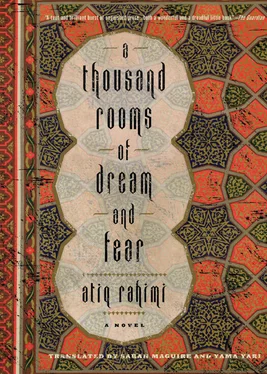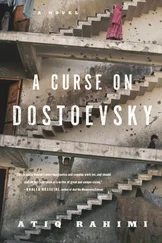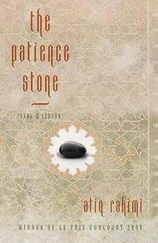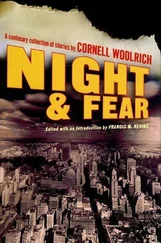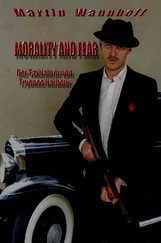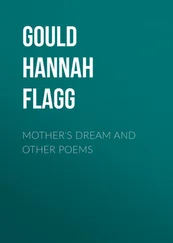Joseph’s cries resound inside the mosque. His envious brothers have thrown him into a well. My grandfather’s sobs emerge from the darkness. He would weep like Jacob every time he heard that verse.
I aim my piss at the roots of the tree. A bullet whizzes right past me.
“You atheist infidel!”
The bullet has lodged in the tree. My piss has come to an immediate halt. The man crashes toward me through the darkness of the night.
“Damn your father! Infidel! What do you think you’re doing pissing there like a donkey?”
He waves the barrel of the gun in the direction of the mosque, so I turn and walk back. When we reach the door he shouts, “Stay out! You’ll defile the mosque with your filth!”
He goes inside. The trials of Joseph stream through the opened door of the mosque accompanied by a dazzling shaft of lamplight. A passing caravan rescues Joseph from the well, then sells him as a slave to a minister of the Pharaoh.
The man reappears and gestures with his gun for me to follow him. We walk back down to the stream.
“Make your ablutions!”
Mechanically I sit down by the water and begin to wash my hands, then my feet. I repeat the ritual prayer of ablution in silence to myself. My mind is fixed on the barrel of his gun.
“You atheist pig! Infidel! Aren’t you going to wash your private parts?”
I am shaking. I don’t know whether it’s from cold or fear. I pull down my trousers. Just as I begin to wash myself, the man lunges at my balls. I spin backwards.
“Don’t you dare move! Why haven’t you shaved yourself?”
He grabs at my pubic hair, ripping out a tuft. My yelp skims across the stream.
“You filthy infidel!”
I finish my ablutions and pull up my sopping trousers. I am speechless with fear and humiliation.
He forces me to bend over the stream and begin my ablutions again. Then, in bare feet, under pain of death, I follow the man back to the mosque. I wonder where Joseph has gotten to?
“… Zulaikha, Potiphar’s wife, desired Joseph. She invited him into her chamber and, locking the door demanded, ‘Come close to me!’ ”
The mosque is alive with the devilish temptations of Zulaikha.
“… With Joseph intent on escape and Zulaikha intent on holding him fast, they both ran toward the door when suddenly Zulaikha’s husband appeared. She cried out to Potiphar: Tell me how you will punish one who wishes to bring harm to your household? Does this crime not merit imprisonment or torture?”
At the very moment I walk into the mosque, Joseph is thrown into jail. The man sitting at the front signals to the young student to stop reading, consigning Joseph’s fate to the depths of the Koran.
The dervish is still in the same place, his eyes glued to a lantern hanging on the wall. The man who has brought me back to the mosque orders me over to the corner. I go to sit near the dervish.
The cleric’s voice sounds out from the front of the mosque:
“Consider the plight of Joseph. Consider how Satan set many traps in his path. Never forget that women are the temptation of the devil!”
The man who stopped me from pissing goes over to the cleric and whispers something in his ear. The cleric fixes me with a horrified look and gets to his feet. The crowd of students begin to chant, “Praise be to Allah! Mohammed is our savior!”
But all I can hear is the voice of the dervish:
“Why can’t you find in yourself the strength you attribute to Mohammed? In the end, only you can save yourself …”
Why don’t they finish the story of Joseph? Is my fate really more important than his?
After a brief discussion with two or three of his students, the cleric walks toward me.
“This man is an infidel!” he informs the young bearded man, his eyes burning with hatred. “He must never be allowed to leave for Pakistan to spread his filth.”
He turns his back and leaves the mosque.
The dervish settles his head back onto his brick.
The mosque, now emptied of hash fumes, is feverish with Joseph’s anxiety.
Joseph lies in chains in a dungeon. In his grief-filled house, Jacob has gone blind. And Joseph’s mother? Where is she? Surely her suffering is much worse than Jacob’s. And Zulaikha’s anguish is even more intense. If Jacob has shut himself away in his room to grieve, these two women have turned themselves into rooms of grief. Not rooms built of bricks and mortar, but rooms carved from the heart! Why does no one ever think about these two stricken women? It is his mother who most needs the healing sight of Joseph’s coat of many colors, not his father!
The mosque slumbers in the stupor of hashish. While I take my rest in the strength of Zulaikha’s love.
“Unless sleep is less restless than wakefulness, do not rest!”
It’s the dervish standing right above my head. He gives me his hand and leads me out of the mosque.
The mosque, mute and immobile, is soon lost in the mists of the night. We find ourselves, the dervish and I, by the side of the stream. The dervish splashes a little water on my face.
“Who are you?” I ask.
He answers with a smile.
“That’s a difficult question. Let me think about it for a while …”
He gulps down some water. I am waiting for his answer.
He chuckles at my impatience.
“They call me ‘the bird.’ ”
Not another word.
We walk together along the banks of the stream. By his side, all my fears and anxieties have gone. After a few meters, the dervish stops.
“You must always keep moving,” he says.
He sits down by the stream and plunges his hand in the water.
“Once water stops flowing, it stagnates. Once water stagnates, it poisons the ground. Be like this stream, always in flux!”
“I want to go back.”
“We’ll all go back one day.”
His hand caresses the water.
“No, I want to go back home, to Kabul.”
“Here, they want to murder your body. There, they’ll murder your soul!”
He takes the brick out from under his cloak and dips it in the stream.
“One day all of us will be like the mud of this brick.”
With a smile on his face, he stands up and leaps to the other side of the stream. We walk beside the water. After a few paces the stream disappears underground.
I don’t want to go back to the mosque. I want to stay with this man till dawn. Tomorrow I’ll ask the trafficker to take me back to Kabul …
“Once you find yourself, always keep moving!”
The dervish’s words pull me back from the journey to Kabul in my head. His voice becomes indistinguishable from the gurgling of the stream. We have arrived at its source.
“If you meet someone on your journey, grab him by the scruff of the neck and hang on!”
The dervish is getting fainter. The sound of his voice roots me to the spot.
“And if you never meet anyone … then hang on to yourself!”
He’s going.
“Where?”
He can’t hear me. Or he doesn’t want to answer. I can’t move.
I’m completely paralyzed. The dervish disappears into the night.
“Don’t leave me!”
The despair in my voice settles on the water.
The dervish’s voice emerges from the darkness.
“Hang on to yourself!”
A halo of smoke marks the place where the dervish was standing a minute ago. The oil-lamps give off a weak light. Even weaker than I am. Everyone is asleep. I want to get up. I feel too heavy. I lean against the wall of the mosque.
“What are you doing?”
The sleepy voice of the man on the mat next to mine makes me freeze. Without knowing why, I hear myself asking, “Where is the dervish?”
I find myself pointing toward the place where the dervish used to be. The man lowers his head to his mat, covering his eyes with a corner of his turban. His murmuring voice disappears into the folds of cloth.
Читать дальше
